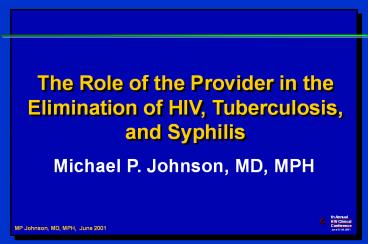Considerations in Alternative Therapy - PowerPoint PPT Presentation
1 / 18
Title:
Considerations in Alternative Therapy
Description:
th Annual. HIV Clinical. Conference. 4. June 21 24, 2001 ... Enhanced health promotion. Adapted from: www.cdc.gov/stopsyphilis ... – PowerPoint PPT presentation
Number of Views:56
Avg rating:3.0/5.0
Title: Considerations in Alternative Therapy
1
The Role of the Provider in the Elimination of
HIV, Tuberculosis, and Syphilis
Michael P. Johnson, MD, MPH
MP Johnson, MD, MPH, June 2001
2
Prevention/Elimination PlansHIV, Tuberculosis,
Syphilis
- No Time to Lose Getting More from HIV Prevention
(2000) - IOM Study, found at www.nap.edu/books/0309071372/
html/ - Ending Neglect The Elimination of Tuberculosis
in the US (2000) - IOM Study, found at www.nap.edu/catalog/9837.html
- Hidden Epidemic Confronting Sexually Transmitted
Diseases (1997) - IOM Study, found at www.nap.edu/catalog/5284.html
- National Plan to Eliminate Syphilis from the
United States (1999) - CDC Plan, found at www.cdc.gov/stopsyphilis/
3
HIV Prevention in Clinical Setting
- 44 MDs, with of patient population HIV 53
- Reported revisiting HIV prevention for one of
following - medical cue (such as STI) 44
- patient report of change in relationship 36
- doubt about patient report of behavior 12
- routinely conduct risk behavior discussion 12
Adapted from Gerbert, AIDS Educ Prev, 1999
4
HIV Prevention
- Risk Screening
- History sexual and drug using behavior
- underlying determinants of risky
behavior - Exam initial visit - syphilis, hepatitis,
herpes simplex, consider culture for
chlamydia/GC - routine follow-up with some tests,
which tests and how frequently not clear
5
HIV Prevention
- Behavioral Intervention
- Make targeted assessment (screening)
- Deliver targeted prevention messages
- Be prepared for referrals, especially for
underlying barriers to prevention (e.g. violence,
mental illness) - Reinforce messages elsewhere in clinic/clinic
staff
6
HIV Prevention
- Partner Notification
- Voluntary referral of partners/contacts for
screening and care - Ask about new contacts at each visit
- Partner notification can be done through health
department or clinic resources/staff or local
support/case management services
7
Reported TB CasesUnited States, 1979-1999
30000
28000
26000
Cases
24000
22000
20000
18000
Year
Adapted from CDC surveillance data
8
Number of TB Cases inUS-born vs. Foreign-born
Persons United States, 1992-1999
No. of Cases
Adapted from CDC surveillance data
9
Tuberculosis in RWCATitle III program
- Clients served in 1999 108,945
- Active tuberculosis
- active TB during the year 689 (0.6)
- newly dxed during the year 320 (46)
- Treatment of latent tuberculosis infection
- clinically indicated treatment 1,753 (1.6)
10
Administering the Tuberculin Skin Test
- Inject intradermally 0.1 ml
- of 5 TU PPD tuberculin
- Produce wheal 6 mm to
- 10 mm in diameter
- Read only induration
- 48-72 hrs after placement
- Reaction of 5 mm or greater in HIV-infected
- persons is a positive test
11
Treatment of Latent Tuberculosis Infection
- Isoniazid
- 9-month regimen considered optimal, can be given
twice- weekly if directly observed - Rifamycin / Pyrazinamide
- A rifamycin and PZA daily for 2 months
- Administration of rifampin (RIF) contraindicated
with - some protease inhibitors (PIs) and nonnucleoside
- reverse transcriptase inhibitors (NNRTIs)
- Rifabutin can be substituted, but requires dosage
adjustments
Adapted from MMWR 2000 49 (No. RR-6)
12
Treatment of Tuberculosis for HIV-Positive
Persons
- Initial rx phase should consist of INH, RIF, PZA,
EMB
- RIF-based regimens generally used for patients
- 1) who have not started antiretroviral therapy
- 2) for whom PIs or NNRTIs are not being used
- Rifabutin (RBN) may be substituted for rifampin
(RIF)(with dose adjustment) - Alternative regimen can be INH, EMB, PZA, SM
Adapted from Am J Respir Crit Care Med 1994 149
13
Ending Neglect Elimination of Tuberculosis in
the United States
- Target for elimination
- Less than 0.1 case per 100,000
- Recommendations
- Maintaining control - rx of active disease
- Speeding the decline - rx of latent infection
- Developing new tools - vaccine, diagnostics,
drugs - Engaging in global tb control - collaboration
- Mobilizing support for elimination - education,
eval.
Adapted from Ending The Neglect, IOM, 2000
14
Primary and Secondary Syphilis - Reported Rates
for 15-19 Year old Females by Race and Ethnicity
United States, 1981-1998
Adapted from CDC surveillance data
Note Black, White, and Other are non-Hispanic.
15
Primary and Secondary Syphilis - Reported Rates
for 15-19 Year old Males by Race and Ethnicity
United States, 1981-1998
Adapted from CDC surveillance data
Note Black, White, and Other are non-Hispanic.
16
Diagnosis of Syphilis
- Darkfield microscopy is definitive
- Serologic (treponemal and non-treponemal) tests
are presumptive - Titers determine cure, failure,
reinfection/relapse - After therapy
- Cure 4-fold (or 2 dilution) decrease (e.g. from
132 to 18) - Failure no change or increase
- Reinfection documented titer response then a
4-fold increase
Adapted from MMWR 199847RR-1
17
Therapy for Syphilis
- Parenteral penicillin G (Pen) is drug of choice
for all stages of syphilis - Doxycycline, 100mg PO BID x 2 wks, for
pen-allergic - Pen is the ONLY therapy with documented efficacy
for neurosyphilis or for syphilis during
pregnancy - Primary/secondary syphilis 2.4 million units IM
- Follow-up 3, 6, 9, 12, 24 months
- Treatment failure within 6-12 months CSF exam
- Retreat with 7.2 million units of pen if normal
CSF
Adapted from MMWR 199847RR-1
18
National Syphilis Elimination Plan
- Target for elimination
- reduce syphilis cases to 1,000 or fewer and
increase the number of syphilis-free counties to
90 by 2005 (national definition) - absence of new cases within jurisdiction except
within 90 days of report of imported case, (local
definition) - Recommendations
- Enhanced surveillance
- Strengthened community involvement and
partnership - Rapid outbreak response teams
- Expanded clinical and laboratory services
- Enhanced health promotion
Adapted from www.cdc.gov/stopsyphilis































